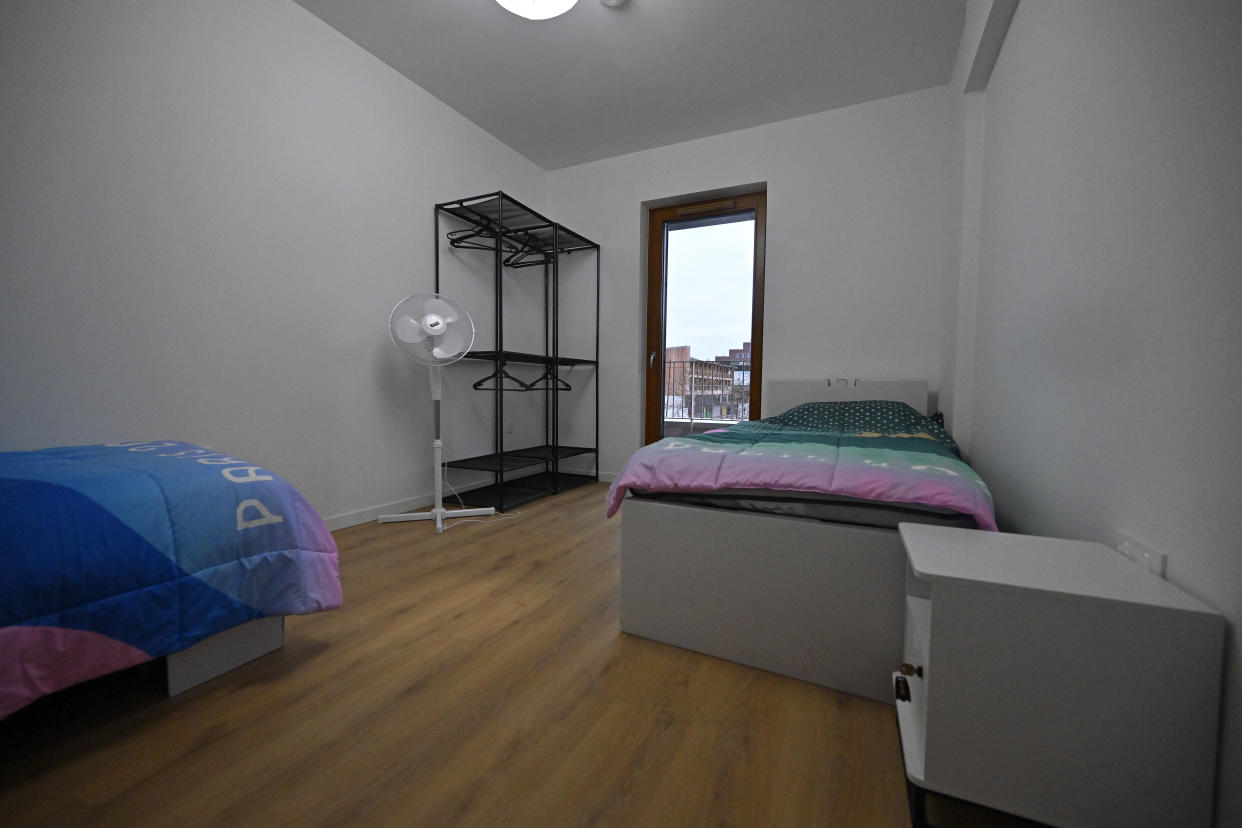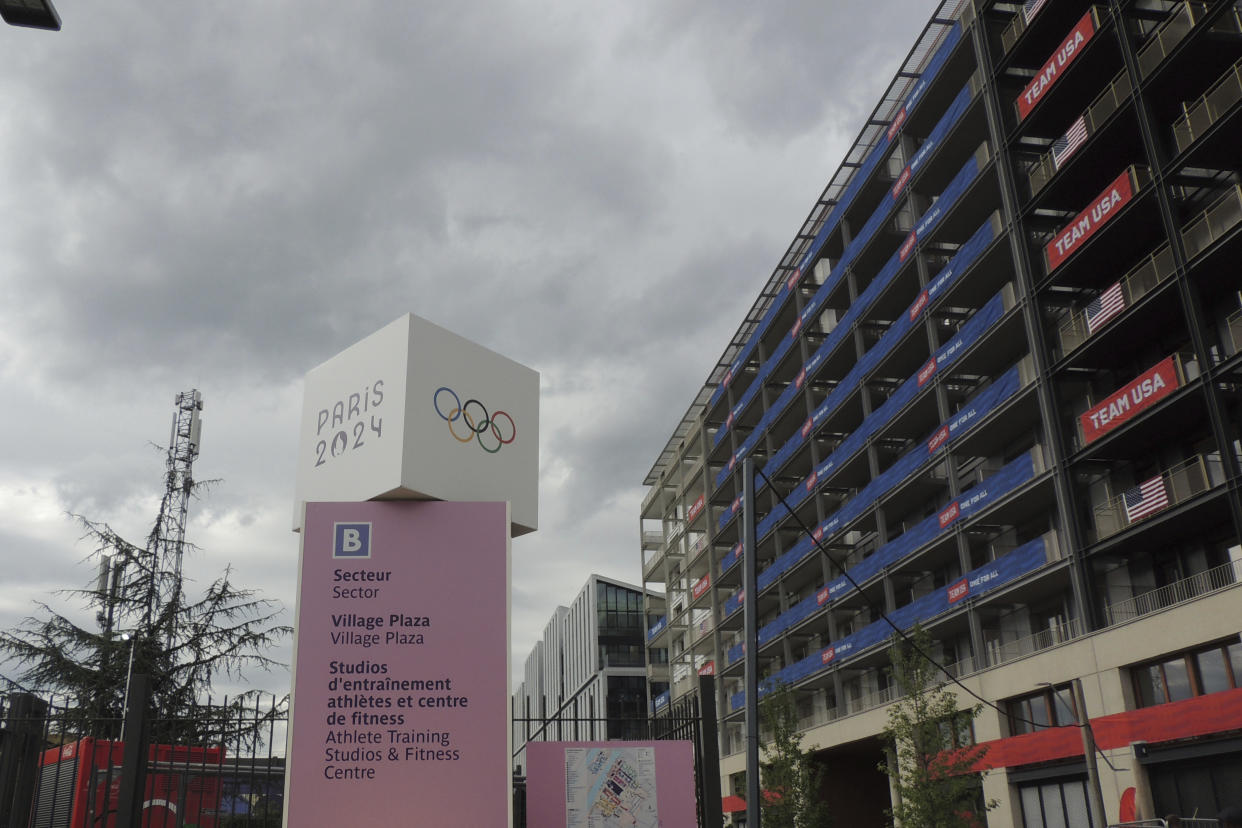The Paris Olympics’ first battleground: air conditioning
They promised to host the “greenest” Olympics ever, a Games that would double as an eco-friendly model for a warming world. All involved in the planning of Paris 2024, from the IOC to politicians, seemed to be on board. They touted a plan to halve the carbon footprint of the Olympics. They’d ditch diesel generators for renewable energy; they’d shun gas-guzzling buses for electric vehicles; they’d repurpose existing venues and build repurposable ones, with seats made from recycled plastic.
For years, Paris Olympic organizers trumpeted their commitment to sustainability, and athletes nodded along, until they arrived at a prickly piece of the plan: no air conditioning.
Architects, instead, had equipped the Olympic Village with a more energy-efficient geothermal cooling system. It could, they said, keep athlete dorms roughly 11 degrees Fahrenheit below outdoor temperatures, which in Paris average around a high of 78 in July and August. Organizers pledged that the rooms would stay below 26 Celcius — 79 Fahrenheit. Paris mayor Anne Hidalgo insisted that athletes would be “very comfortable.”
But many athletes demurred.
Team physiologists, concerned about their sleep, raised concerns.
National Olympic committees objected. “Some delegations have even threatened to leave the village,” Le Monde reported last year.
So they fought, and won, a battle with Paris organizers over the availability of air conditioning at the 2024 Olympics. Thousands of AC units are being shipped to the Village, which will open its doors to over 10,000 athletes between the Olympic and Paralympic Games. Most wealthy national Olympic bodies, including the U.S. Olympic and Paralympic Committee, have either brought their own portable units or purchased rental units through the Paris 2024 organizing committee.
Over the past two years, organizers routinely pushed back on the AC demands. The issue became “sensitive,” one plugged-in official said, and “more loaded than you’d think.” Hidalgo publicly urged Olympians to “trust the scientists” who’d designed the Village. Many Olympians, meanwhile, wanted to respect their hosts. No U.S. athlete wanted to be the privileged “Ugly American” who complained.
But they also wanted to win. To win, they need to sleep.
“We appreciate the concept of not having air conditioning due to the carbon footprint,” Australian Olympic Committee CEO Matt Carroll said last year. “But it is a high-performance Games. We’re not going for a picnic.”

To have AC or not to have AC
The concept of an AC-free Olympics, hatched years ago in Paris, struck right at the heart of Planet Earth’s climate conundrum.
Mechanical air conditioners, an American staple since the 20th century, have become a critical tool to combat the searing impact of climate change — but also an accelerator of it. They account for 5-10% of annual global greenhouse gas emissions, according to data maintained by various international agencies and environmental groups. Their collective footprint is expected to rise in coming years, perhaps doubling by 2050, unless humans curtail usage.
Paris 2024, therefore, opted for alternatives at the Village — which will become an “eco-neighborhood,” office space and affordable housing after the Games.
Its innovative cooling scheme, a combination of several measures, will use less energy and fall in line with the organizing committee’s broader approach to sustainability.
"We want to show that another model is possible, and create a legacy for major sporting events,” Georgina Grenon, Paris 2024’s environmental excellence director, told AFP.
So they planted trees and gardens in the Village; they oriented most (not all) apartments to shield windows from the sun; and they built a maze of pipes underneath floors. The pipes tap into underground wells and circulate water through the buildings, thereby chilling each room.
Some Olympic teams — especially those from European countries where AC is much less prevalent — were satisfied with the setup. “The buildings in the OV are built to reduce heat with a clever bundle of passive measures,” a German Olympic Sports Confederation spokesman told Yahoo Sports via email. “We checked these during our regular visits, the concept is working fine.”
Swedish and French spokesmen also said their delegations would rely on the geothermal system, plus other simple mechanisms such as filters, shutters and fans.
Some of their counterparts in the Americas, Europe and Asia, though, balked at the mere thought of an Olympics without air conditioning. Spokespeople for the committees of Canada, Australia, Brazil, Britain, Italy and Norway told Yahoo Sports that they’d be renting AC for Village apartments. Japan and Greece have also confirmed their AC plans. Canada cited its “commitment to providing optimal health and performance conditions.” An Australian spokesman said: “The reasoning is high performance.”
“After several meetings with the entire multidisciplinary team that supports the athletes' preparation and performance,” a Brazil spokesman wrote in an email, “the BOC understood that there was no way to guarantee ideal rest and recovery conditions without renting air conditioning units.”
Sleep, specifically, seemed to be the main consideration. A Team USA physiologist cited research that “has consistently shown that the optimal bedroom sleep micro-environment is within the range of 61°F to 65°F.” Athletes worried that Village temperatures potentially up to 79°F could disrupt them, and leave them weak or woozy on the biggest days of their sporting lives.
Some experts scoff at that rationale. “These are physically extraordinary athletes,” Stan Cox, a scientist who wrote a book about AC, told Yahoo Sports with a chuckle. “They can't handle sleeping in a temperature in the high 70s?” He mentioned the adaptive comfort model, and suggested the human body could adjust.
But these, Cox later conceded, are habit-driven humans who spend four years training for competitions decided by inches in split-seconds. The Games are not a time to leave anything to chance. The fear of sweaty nights, even if unfounded, could on its own be a costly distraction.
“This is a period of time in which consistency and predictability is critical for performance,” USOPC CEO Sarah Hirshland said. “And in our conversations with athletes, this was a very high priority, and something that the athletes felt was a critical component in their performance capability, and the predictability and consistency of what they're accustomed to. And so, yes, we will have air conditioners.”

An unwieldy compromise
The push for AC became so forceful that, sometime last year, organizers gave in. They agreed to make compact units — Darty Proline PAC1800s — available via “rate card,” the traditional Olympics platform that allows participants to order certain products for use during the Games. Augustin Tran Van Chau, the deputy general manager of the Village, said earlier this month that "around 2,500 ACs have been ordered.”
But the Parisians weren’t happy about it.
“It’s a pity,” Grenon told the Washington Post.
Hidalgo, a staunch environmentalist and the fiercest voice in this fight, said last year: "I have a lot of respect for the comfort of athletes, but I think a lot more about the survival of humanity.”
That’s the perspective from which Cox was coming from, too. He and other experts have railed against America’s physical and cultural “addiction” to AC. Over 90% of U.S. homes have it, according to U.S. Census data. Most probably overuse it. Many leave it on at all hours of the day, chilling rooms they aren’t in.
And many feel they need it, because most Americans have never considered alternatives. “It's the way our society has developed since the '60s,” Cox said. “We've locked in dependence on air conditioning.”
Most other countries haven’t. China has rapidly adopted AC, but only around 20% of European homes have it. Dozens of developing countries in tropical climates are the ones who really need it, but many can’t afford it. (Nor can some Olympic committees; in Paris, AC will be yet another First World advantage.)
As the planet continues to warm, millions of homes, in countries rich and poor, will add AC. What Cox, and Hidalgo, and many others hope is that the millions might consider other, lower-emission cooling methods. That’s the main reason Village architects eschewed AC. “I want the Paris Games to be exemplary from an environmental point of view,” Hidalgo said.
And in the end, they reached an unwieldy-but-palatable compromise.
“We believe we have found a good balance between our primary commitment to athlete well-being and our responsibility as major event organizers in the face of climate change,” a spokesman for Paris 2024 told Yahoo Sports.
“What matters to me,” Hidalgo said in March, “is that these buildings, these flats will become a neighborhood where people from [Paris suburbs] will live. These new buildings won't need air conditioning. We're working for the long term."


